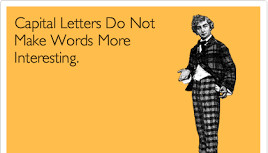
The curse of Random capitalization
This is an Important Post. You know that because it includes Unnecessary Capital Letters.
This is the curse of random capitalization, the misuse of capital letters to make things appear more important than they are.
Some things are meant to be random, such as acts of kindness and the winning lottery numbers. Capitalization should never be random. Random capitalization forces readers to pause for a micro-moment to guess why a particular word is capitalized and then, when they realize it shouldn’t be, adjust downward their opinion of the writer and what he or she is trying to say.
Grammar has strict rules about when and what to capitalize, but these rules are frequently ignored in bad business writing. The result is text that looks like the Declaration of Independence (“. . . that they are endowed by their Creator with certain unalienable rights, that among these are Life, Liberty and the pursuit of Happiness.”) or a Winnie-the-Pooh book (“‘If I know anything about anything, that hole means Rabbit,’ he said, ‘and Rabbit means Company,’ he said, ‘and Company means Food and Listening-to-Me-Humming and such like’.”)
Neither style is a good fit for the quarterly report.
Why do people do it? Because they think capital letters equal Importance. Others, in doubt and unsure of the rules, default to capitalization. Actually, they would be correct more often if they defaulted to lowercase.
So, a quick recap of the basics of when and what to capitalize (with the usual caveats that there are exceptions to every rule and that I’m not addressing every situation, just the ones that arise most frequently in business writing.):
- Proper nouns — In general, capitalize the proper names of people, places and things.
Incorrect: Groucho Marx was a Comedian who made movies in Hollywood, including "Duck Soup." He was a Pioneer of Nihilistic Humor.
Correct: Groucho Marx was a comedian who made movies in Hollywood, including "Duck Soup." He was a pioneer of nihilistic humor.
Groucho Marx, Hollywood and "Duck Soup" are always capitalized because they are proper names of a person, place and thing, respectively. The words “comedian”, “pioneer” and “nihilistic humor” are lowercase because they are improper or common nouns, which describe general things.
Incorrect: The new Campaign should result in greater Market Share.
Correct: The new campaign should result in greater market share.
Campaign and market share are common nouns and don’t require capitalization.
Also, capitalize adjectives derived from proper nouns, such as “a Shakespearean tragedy” and “a Freudian slip.”
2. Titles — Capitalize titles when they come before a name, but not after: Department Director Rufus T. Firefly, not Rufus T. Firefly, Department Director. And occupations are not titles, so don’t capitalize them. Don’t write Software Developer Margaret Dumont; write software developer Margaret Dumont.
Don’t capitalize a title if it’s not used with the titleholder’s name, such as chairman, president or professor. Most executive bios are full of bad examples: From 2008 to 2011, Otis B. Driftwood was Director of R&D at Acme Corp. He left the Company to became a Professor of Biology at Huxley University.
Tricky exception I — Don’t capitalize a title before a name if there is a comma in between, i.e. December’s salesman of the month, Jeffrey Spaulding, refuses to surrender his reserved parking space to this month’s winner.
Tricky exception II — Capitalize titles that replace someone’s first name: General Grant, Professor Wagstaff.
3. Departments etc. — It’s OK to capitalize when referring to a specific department or official entity, i.e. Human Resources has ordered Sales to stop instigating water gun fights with other departments. The capital letters signify that the writer is referring to specific departments. Don’t capitalize sales when referring to something in general, i.e. If sales rebound this year we can afford new Super Soakers.
4. Quotations — Capitalize the first word of a quotation if it begins a complete sentence, but not if the quoted words are only part of a sentence.
Correct: Vice President Lionel Q. Deveraux said, “One more Super Soaker attack and I will bring the hammer down on Sales.”
Also correct: Vice President Lionel Q. Deveraux said one more Super Soaker attack and he will “bring the hammer down” on Sales.
Keep in mind, that it’s perfectly fine to write a sentence that has a single capital letter at its beginning. There’s no prize for additional capital letters and a communication does not gain in importance proportionate to its number of capital letters.
Remember this because it’s Very Important.
-30-
This is Part 8 of the How to Write More Better for Business series. Previous entries can be found here and here.
@jimsweeney61 is vice president of editorial at Adcom, an advertising agency in Cleveland, Ohio.
Requirements Engineer at Saab Kockums
3yOk, this post is a little bit old now, but I've seen this used, on several social platforms (by young people), where the intention clearly has been to convey irony, typically on a phrase. Language is liberal and formative to its core nature, not normative. Resistance is futile... 😀
Vice President, Avantis Investors
4yI stumbled across this older post, but it may as well have been written yesterday. Thank you James!
Owner, Danielle P. McCluskey, P.C.
8yNo, but They Do Make Your Efforts Seem More Important!
REALTOR® at Keller Williams Greater Metropolitan
8yCURSES!!! Foiled again by the editor.